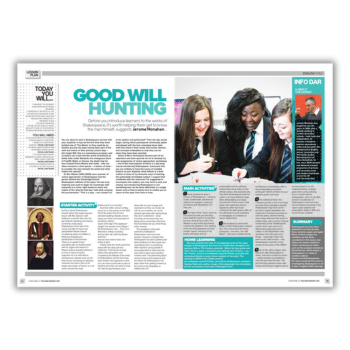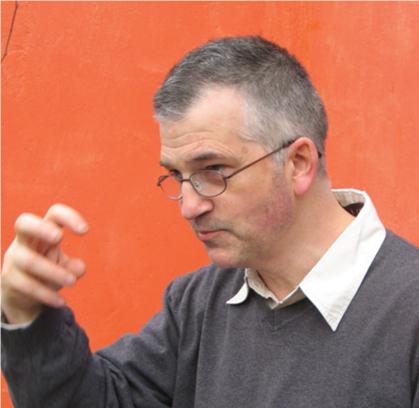Before you introduce learners to the works of Shakespeare, it’s worth looking at his portrait. Help students get to know the man himself with this KS3 lesson plan…
You are about to start a Shakespeare set text with your students. It may be the first time they have tackled one of ‘The Works’ or they could be on familiar ground. Still, this is a momentous occasion.
So before you crash into the world of Scotland as failed state under Macbeth; the ambiguous Illyria of Twelfth Night; or Verona, the death-trap for star-crossed lovers Romeo and Juliet, why not allow everyone a short pause to consider the man himself, his world and what makes him special?
Learning objectives
- Think about the playwright Shakespeare and his possible appearance by looking at portraits
- Consider why it matters at all that we know what Shakespeare looked like
- Become a better ‘reader’ of images and alert to some of the differences between Shakespeare’s age and ours
Starter activity
Get students speaking and sharing comments made about Shakespeare at the start of his career and after it.
Read about pamphleteer Robert Greene complaining about William in 1592. You can also look at Ben Jonson writing about him in the preface to the 1623 First Folio.
Initially recite the whole speeches aloud with the class (call and response). That may be enough before discussing them and considering the attitude of the writer to Shakespeare, but the lines have been broken into segments so that you can share out the bits to pairs of students who then can work on their ‘bit’ with the goal being to say it aloud with as much energy and expression as they can muster.
As with all such activities, do not let students get away with saying things they don’t understand – keep checking. Because they are taking some ownership of the lines they’ll probably ask you what things mean anyway.
The quotations mark polar extremes of attitudes to Shakespeare, and much else besides. Greene’s complaint that Shakespeare has been grabbing the ideas (‘feathers’) of other poets and ‘beautifying’ them is something I often repeat to young people to encourage them to share and use each other’s ideas when tackling creative work.
The great thing about Jonson’s lines is the insistence that we search for Shakespeare in his plays rather than getting hooked up too much on his biography, or relative lack of it.
Jerome Monahan has taught for over 20 years. Since 2000 he has devised and delivered a broad programme of primary and secondary inset and student workshops across the UK and internationally. Browse more ideas for Shakespeare Week.











